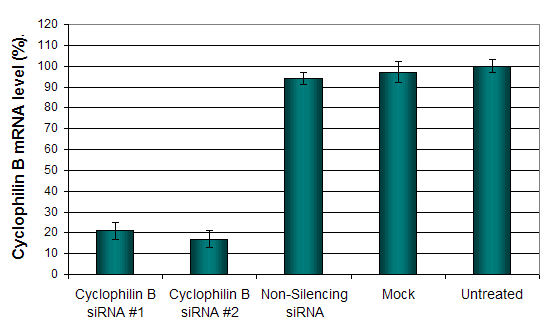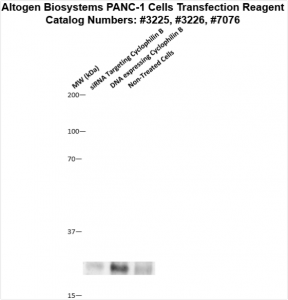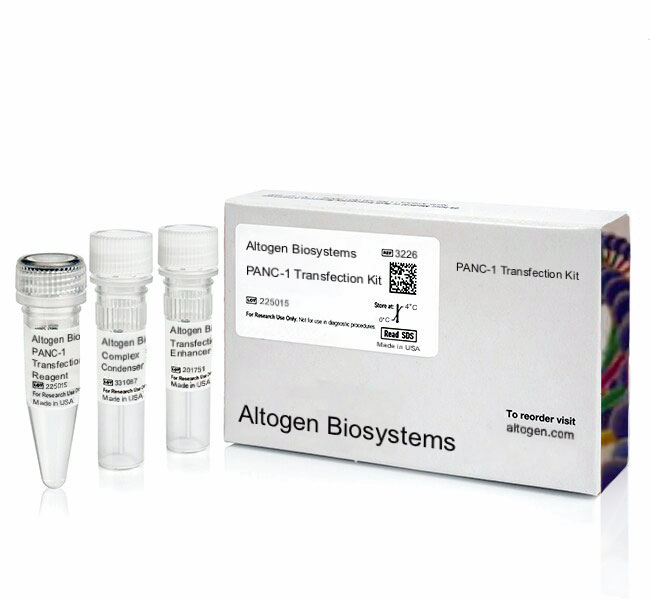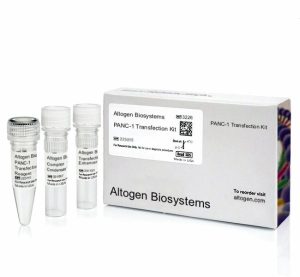Description
Purchase Orders: Click “Add to Cart” button to order, then email PO to orders@altogen.com.
Product Availability: In Stock.
Transfection Reagent for PANC-1 Cells (Non-endocrine Pancreatic Cancer)
- Proprietary cationic lipids formulation
-
High transfection efficiency of small RNA (siRNA, shRNA, miRNA), mRNA, pDNA
- A proven reagent for establishing stable cell lines
-
Optimized transfection protocols are adapted for use with both standard & reverse transfection methods
-
Download in vitro PANC-1 transfection protocol: [PDF]
- Download PANC-1 CRISPR/Cas9 transfection protocol: [PDF]
- Download PowerPoint presentation for PANC-1 cells transfection kit: [PPT]
- UPC/GTIN/EAN: 860002089795
-
Brand: ALTOGEN®, developed and manufactured by Altogen Biosystems
Transfection Efficiency:
Reagent exhibits at least 85% transfection efficiency of siRNA delivery. Transfection efficiency was determined by RT-PCR.
Product Description:
This transfection kit is specially designed for the PANC-1 cell line, a human pancreatic ductal adenocarcinoma cells. Transfection reagent supplemented by complex condenser and transfection enhancer ensures high efficiency in delivering cargo biomolecules into PANC-1 cells.
Transfection Protocol and SDS:
Download Altogen Biosystems PANC-1 Transfection Protocol: [PDF]
Download SDS: [PDF]
PANC-1 Cell Line:
According to journal Nature, pancreatic cancer has a 5-year survival rate of 5%, making the quest for a reliable cure urgent. Pancreatic ductal adenocarcinoma is the fourth primary cause of cancer-related fatalities, comprising nearly 90% of all pancreatic malignancies. PANC-1 is a well characterized and extensively studied cell line that is frequently employed as in vitro model for pancreatic ductal adenocarcinoma research. The PANC-1 cell line plays an essential role in pancreatic cancer therapeutic assays. The PANC-1 cell line was established from pancreatic duct tissue of a 56-year-old Caucasian male with epithelioid carcinoma. PANC is short for pancreas, referring to the Human pancreas, where cancer can be found. Also, the PANC-1 cell line serves as a suitable transfection host. The growth of these cells is inhibited by L-asparaginase.
PANC-1 cells are used as an in vitro model of non-endocrine pancreatic cancer for tumorigenicity studies. These cells possess the type B phenotype for glucose-6-phosphate dehydrogenase G6PD and overexpress heregulin/human epidermal growth factor receptor 2 (HER2/neu) oncogene, which is present in 60 to 70% of human pancreatic carcinomas but are estrogen receptor (ER) negative. PANC cells have been shown to be negative for MUC4 and positive for Smad4, a TGF beta signaling cascade protein inactivated in human gastrointestinal cancers. PANC can be induced to differentiate into hormone-producing islet-like clusters following stimulation by the FGF2 growth factor. The PANC-1 cell line has an estimated doubling time of 52 hours with a modal chromosome number of 63. Also, these cells have Glucose-6-phosphate dehydrogenase activity of the slow mobility of B type. Altogen Biosystems provides proprietary cationic liposome formulation that demonstrate high efficacy transfection of PANC-1 cells. Transfection kit is preoptimized for the intracellular delivery of plasmid DNA, siRNA, and mRNA molecules into PANC-1 non-endocrine pancreatic cancer cell line. PANC-1 cells are known to exhibit a variety of genetic alterations that are commonly found in pancreatic cancer, including mutations in the KRAS, TP53, and CDKN2A genes. They also produce high levels of several enzymes, such as amylase, lipase, and trypsin, which are characteristic of pancreatic acinar cells.
PANC1 cell line mutations:
| KRAS | 3845 | 37 | 12 | 25398284 | 25398284 | Missense_Mutation | SNP | C | T |
| TP53 | 7157 | 37 | 17 | 7577120 | 7577120 | Missense_Mutation | SNP | C | T |
| PCDHB3 | 56132 | 37 | 5 | 140482555 | 140482555 | Silent | SNP | C | T |
| NIPAL2 | 79815 | 37 | 8 | 99215392 | 99215392 | Missense_Mutation | SNP | G | A |
| LRRC18 | 474354 | 37 | 10 | 50121549 | 50121549 | Missense_Mutation | SNP | G | A |
| RUNDC3B | 154661 | 37 | 7 | 87399954 | 87399954 | Silent | SNP | C | T |
| ATRNL1 | 26033 | 37 | 10 | 117024752 | 117024752 | Silent | SNP | C | T |
| DUOXA2 | 405753 | 37 | 15 | 45408042 | 45408042 | Missense_Mutation | SNP | G | A |
| WDTC1 | 23038 | 37 | 1 | 27621110 | 27621110 | Missense_Mutation | SNP | G | T |
| KDM4A | 9682 | 37 | 1 | 44157211 | 44157211 | Missense_Mutation | SNP | T | C |
Data:

Figure 1. Cyclophilin B silencing efficiency was determined by RT-PCR in the PANC-1 cells transfected by Cyclophilin B siRNA or non-silencing siRNA control following the recommended transfection protocol. Cyclophilin mRNA expression levels were measured 48 hours post-transfection. 18S rRNA levels were used to normalize the Cyclophilin B data. Values are normalized to untreated sample. Data are presented as means ± SD (n=3).

Figure 2. Protein expression of Cyclophilin B in PANC-1 cells. DNA plasmid expressing Cyclophilin B or siRNA targeting Cyclophilin B were transfected into PANC-1 cells following Altogen Biosystems transfection protocol. At 72 hours post-transfection the cells were analyzed by Western Blot for protein expression levels (normalized by total protein, 10 µg of total protein loaded per each well). Untreated cells used as a negative control.
Altogen Biosystems is a life sciences company that offers cell type-specific and pre-optimized transfection products, elecroporation kits, and in vivo delivery reagents. Advanced formulation of reagents and optimized transfection protocols provide efficient intracellular delivery of protein, DNA, mRNA, shRNA and siRNA molecules. Read more about transfection technology at Altogen’s Transfection Resource. Altogen Labs provides safety and efficacy preclinical research services. GLP-compliant studies for IND applications, and drug development, including over 90 in-house validated xenograft models, safety toxicology, etc (visit AltogenLabs.com).
Volume Options:
- 0.5 ml (Catalog #3225)
- 1.5 ml (Catalog #3226)
- 1.5 ml CRISPR (Catalog #2187)
- 8.0 ml (Catalog #7076)
Purchase Orders: Click “Add to Cart” button to order, then email PO to orders@altogen.com.
Product Availability: In Stock.






